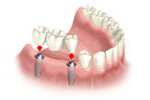Implant Dental Bridges: Supported Bridges in North Miami Beach, FL
Please note we may not offer this service at our office. Contact 305-945-0909 for more information.
What Are Implant-Supported Bridges?
Implant-supported bridges are dental restorations that utilize dental implants to secure a dental bridge. This prosthetic solution replaces one or more missing teeth by anchoring the dental bridge to the jawbone with implant posts, creating a fixed implant bridge that functions like natural teeth.
A dental implant bridge consists of four key components:
- Titanium Posts: These serve as the foundation of your restoration, surgically placed into the jawbone to function like natural tooth roots, promoting jawbone health.
- Abutment: A small metal connector that attaches to the implant posts.
- Porcelain Dental Crown: Customized crowns that are placed over the abutments, providing a natural-looking smile.
- Pontic Teeth: These are the prosthetic teeth that are bonded to the adjacent porcelain dental crowns.
To learn more about implant-supported bridges, contact our North Miami Beach, FL dentist today at 305-945-0909 to schedule an appointment.
Types of Implant Bridges
There are several types of implant-supported restorations, including:
- Fixed implant-supported bridge: A permanent bridge attached to dental implants, designed to mimic the function and feel of natural teeth.
- Removable implant-supported bridge: This bridge can be removed by the patient for cleaning and maintenance, attached to implants with easily detachable connectors.
- Full arch implant-supported bridge: Used to replace an entire arch of missing teeth in either the upper or lower jaw, anchored to multiple dental implants, ideal for those missing most or all teeth in one arch. This is also known as a full arch implant bridge.
- Arch implant bridge: A type of implant bridge designed to replace an entire arch of teeth, providing a stable and long-lasting solution for extensive tooth loss.
- Partial arch implant-supported bridge: A bridge replacing several consecutive teeth, anchored to two or more implants, suitable for a small section of missing teeth.
- Hybrid implant-supported bridge: Combines the benefits of fixed and removable bridges, permanently attached to implants but can be removed by a dentist for maintenance.
Implant-Supported Bridge Benefits
The advantages of an implant-supported bridge include:
- Offers a permanent solution to missing teeth
- Fixed implant bridges do not depend on adjacent teeth for support, avoiding extra stress on healthy teeth
- Helps prevent further tooth loss
- Mimics the look and feel of natural teeth
- Restores normal eating and speaking abilities
- Enhances the patient’s appearance and self-confidence
Cons of Implant-Supported Bridges
As with any tooth replacement option, there are potential drawbacks to consider:
- More invasive and costly than traditional dental bridges
- Healing can take several months
- Risk of implant failure or infection
- Requires sufficient jawbone density and good oral health
- Not suitable for patients with active periodontal disease, uncontrolled diabetes, or other conditions affecting healing
Candidacy for Fixed Bridges
To be eligible for implant-supported bridges, patients need adequate jawbone density and good oral health. Ideal candidates should also avoid smoking, as it increases the risk of implant failure. Implant bridges are not recommended for those with active periodontal disease, uncontrolled diabetes, or other health issues that may affect healing.
The Implant Placement Process
The implant placement process is a crucial step in creating an implant-supported bridge. This procedure involves surgically placing dental implants into the jawbone, which will serve as artificial tooth roots. Typically made of titanium, these implants are biocompatible and integrate well with the surrounding bone, ensuring a stable foundation for the implant-supported bridge.
During the procedure, the dentist will make a small incision in the gum tissue to access the jawbone. Using a specialized drill, a precise hole is created in the bone, and the dental implant is carefully inserted. The implant is then secured in place with a special screw, ensuring it remains stable during the healing process.
After the implant is placed, the gum tissue is closed over the implant, and the area is allowed to heal. This healing period, known as osseointegration, can take several months. During this time, the implant fuses with the surrounding bone, creating a strong and durable anchor for the implant-supported bridge. Once fully integrated, an abutment is attached to the implant, serving as a connector between the implant and the bridge, completing the foundation for your new smile.
Comparison to Traditional Dental Bridges
Implant-supported bridges offer several advantages over traditional dental bridges, making them a preferred choice for many patients. One of the primary benefits is that implant-supported bridges do not rely on neighboring teeth for support. Instead, the dental implants provide a stable foundation, which helps to prevent tooth decay and other oral health issues that can arise from placing extra stress on natural teeth.
Another significant advantage is the longevity of implant-supported bridges. With proper care, these bridges can last for many years, even decades. In contrast, traditional dental bridges may need to be replaced every 10 to 15 years, making implant-supported bridges a more durable and cost-effective solution in the long run.
 Additionally, implant-supported bridges help preserve the natural shape of the face and prevent premature aging. The dental implants maintain the natural contours of the jawbone, which can erode over time due to tooth loss. This preservation of the jawbone structure helps maintain a youthful appearance and supports overall oral health.
Additionally, implant-supported bridges help preserve the natural shape of the face and prevent premature aging. The dental implants maintain the natural contours of the jawbone, which can erode over time due to tooth loss. This preservation of the jawbone structure helps maintain a youthful appearance and supports overall oral health.
Materials Used for Implant-Supported Bridges
Implant-supported bridges are crafted from a combination of high-quality materials, ensuring both durability and a natural appearance. The dental implants themselves are typically made of titanium, a strong and biocompatible material that integrates seamlessly with the jawbone, providing a stable foundation for the bridge.
The bridge portion is usually made from porcelain or ceramic, materials known for their durability and aesthetic appeal. These materials can be color-matched to the natural shade of your surrounding teeth, creating a cohesive and natural-looking smile. Porcelain and ceramic are also resistant to staining, ensuring your smile remains bright and beautiful over time.
In some cases, the bridge may include a metal framework for additional support and stability. However, this is not always necessary, and the choice of materials will depend on the individual needs and preferences of the patient. Your dentist will work with you to select the best materials for your implant-supported bridge, ensuring a result that is both functional and aesthetically pleasing.
By understanding the implant placement process, the benefits of implant-supported bridges compared to traditional options, and the materials used, you can make an informed decision about your tooth replacement options. For more information or to schedule a consultation, contact our North Miami Beach, FL office today at 305-945-0909.
Costs of Implant-Supported Bridges
The cost of an implant-supported bridge can range from $5,000 to $15,000, depending on factors such as:
- The cost for a full arch implant bridge can be significantly higher, depending on various factors such as the region, the experience of the doctor, and the type of materials used.
- Number of Implants: The cost varies based on how many implants are needed to support the bridge. Each missing tooth typically requires an individual implant, increasing the cost with more implants.
- Type of Material: The materials used, such as porcelain or zirconia, can influence the cost. High-quality materials tend to be more expensive but offer better aesthetics and durability.

- Geographic Location: Dental procedure costs can differ significantly based on location, with urban areas and higher cost-of-living regions generally charging more.
- Dentist’s Experience: The expertise of the dentist or oral surgeon can affect the cost, with more experienced professionals possibly charging higher fees.
- Additional Procedures: Additional procedures like bone grafting or sinus lifts may be necessary before or during implant placement, adding to the overall cost.
Frequently Asked Questions
How long do implant-supported bridges last?
Implant-supported bridges can last a lifetime, but their longevity depends on factors such as the quality of the implants, the patient’s oral hygiene, and overall health. Regular dental checkups and cleanings are essential for extending the life of your implant bridge.
Is there an age limit for implant-supported bridges?
There is no specific age limit for implant-supported bridges. However, they are generally not recommended for patients whose jaws are still developing. Older patients may face challenges with lower jawbone density, which can impact implant success, making implant-supported bridges not always the best option for tooth replacement.
How many teeth can an implant bridge replace?
An implant bridge can replace between two to six consecutive missing teeth. For more than six missing teeth, multiple implant-supported bridges or other tooth replacement options may be necessary to fully restore the smile. The number of implants to serve as artificial tooth roots required depends on the number of teeth being replaced.
Are Implant Dental Bridges Right for You?
If you’re missing multiple teeth, it’s crucial to find a dentist who can offer the best teeth replacement options that support other teeth. To learn more about dental implant-supported bridges, contact our North Miami Beach, FL dentist, who can help place dental implants to secure a traditional bridge in the lower or upper jaw. We will help you understand your treatment options to enhance your oral health and improve your smile’s appearance while supporting your surrounding teeth.
Call our North Miami Beach, FL office today at 305-945-0909 to schedule an appointment. We proudly serve patients in North Miami, Aventura, and West Park.

